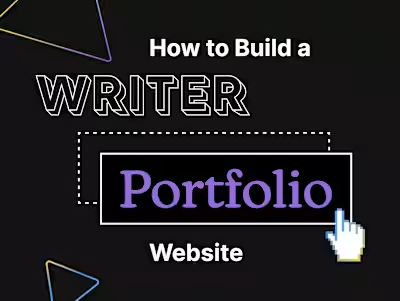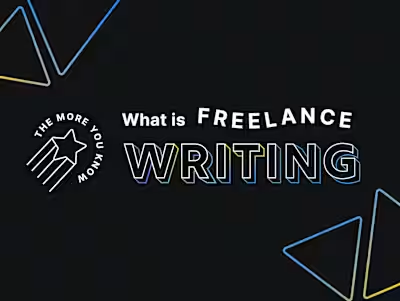How to Get Started as a Freelance Writer (4 Steps)

Congrats! You realize that working independently is a path towards freedom, and you are excited to get started with freelance writing. Hopefully, you’re throwing a party, gushing at the possibilities, and setting goals for the months ahead.
But then Monday hits, and reality sets in. You’re still stuck at your old school 9-to-5 job, slurping down copious amounts of coffee just to survive the week, and you have no clients on the horizon. Good feeling, gone.
You take a deep breath, read some random motivational quotes on the internet, and slog through the first steps of what you deem a long, arduous road ahead.
Maybe you don’t have the support of family and friends who think you are crazy to give up the “stability” of your current job to work more independently. Maybe you thought you had some writing chops, but you got some negative feedback on your first writing project, and you aren’t sure if you have what it takes to make it.
Let’s face it: you know what you want (and need) to do in your heart. That still, small voice won’t go away as much as you try to shove it back down into the depths of denial. You know that working independently means much more than just getting paid to write. It equates to FREEDOM.
Here’s the good news: Though you may feel stuck in a whirlwind of worst-case-scenario projections from your difficult journey ahead to achieve your freelance writing goals, potential opportunities are much closer than you think (I promise).
Now, don’t get me wrong. I’ve been doing this full-time for 13 years now, and I’ve had my share of woes—one that left me weeping on my husband’s shoulder for hours like a toddler who just got their favorite candy snatched away from their tantrum-flailing hands. That story is for another day.
But, I will say that with today’s technology and collaboration capabilities, it is much easier to start freelance writing and working independently (and be great at it).
The world is open to you (literally), and you don’t need a Harvard degree or a long line of wealthy aunts and uncles to realize your dreams. You don’t even need to know how to type well. As I write this, I am ashamedly pecking at my keyboard, yet I’ve earned six figures a year working independently. Don’t let your self-imposed limitations stop you.
OK, enough of the pep talk, let’s get to work. You are likely here because you want to break into freelance writing and work on independent projects. In this article, I will walk you through four steps to starting a freelance writing career so you can build a solid foundation. Ready to have some fun? Let’s do it!

Step 1: What is Freelance Writing, and is it Right for You?
The first step is to determine whether freelancing is the right career path for you. Now, it might be challenging to decide on this without trying a few projects. I will do my best to outline what to expect based on my personal experience and what I have researched.
Freelance writing is essentially what its name suggests: writing on a freelance basis. You get paid by others to complete writing projects or tasks. A company may also pay you a retainer to complete a set number of projects monthly or even hire you hourly.
A freelancer can also be categorized as an “independent worker.” Throughout this article, I will use the terms interchangeably.
Is Freelance Writing Right for You? Pros and Cons
At 9 am, you are in a meeting with your coworker in Rome, and at 10, you meet your best friend for coffee and chat about your exciting new project. Working independently is a wonderful, fluid world that allows us to express ourselves and make deeper connections.
It’s hard to imagine many cons of working independently doing what you love. Work from anywhere, ditch your micromanaging boss, and say goodbye to scheduled, timed breaks and rationed vacation days. Can you say flexibility and happiness?
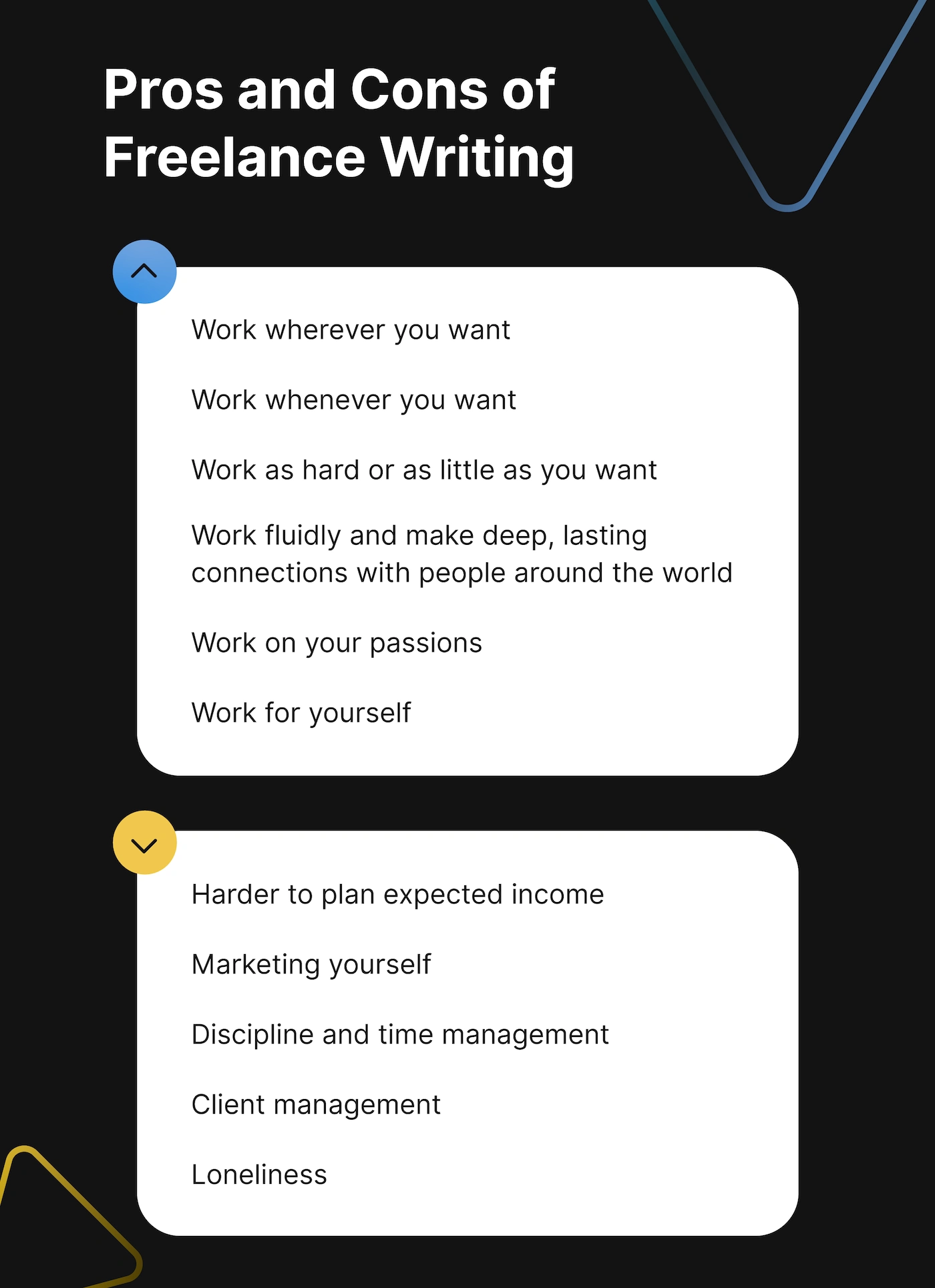
Work wherever you want
Work whenever you want
Work as hard or as little as you want
Freedom to create your own schedule
Work fluidly and make deep, lasting connections with people around the world
Work on your passions
Work for yourself
While getting started with freelance writing sounds like a dream (it kind of is), let’s bring in a small dose of reality. Below are the cons of freelance writing:
Harder to plan expected income
You no longer have paychecks deposited into your account every two weeks. Some months may be lean, and some may be explosive. The key is to learn how to manage your time and money to save for the lean months.
Marketing yourself
Since you work for yourself, you will need to market yourself to keep up enough work to sustain your income goals. And you will have plenty of competition. Besides becoming better at writing, you will also need to master how to market yourself and stand out from the competition.
Discipline and time management
Eliminating the micromanaging boss might seem like a wonderful feat, but only if you can manage your own time and projects. Independent workers must know how to stay disciplined, avoid distractions, and manage their time effectively.
Client management
You got rid of one micromanaging boss, but you now replaced them with 3-4 “bosses” who will require different levels of commitment and work styles. As a freelance writer, you work for yourself, but you still need to please your clients to get paid.
Loneliness
If you’re someone who loves seeing and interacting with many people every day, freelance life might feel lonely. You can still collaborate with others on projects and communicate, but most of your work will happen behind a screen rather than in a crowded workspace. Some independent workers rent co-working spaces so they can feel more connected to others. So, there are options, but your environment might change once you take the independent plunge.
Now, I hope I didn’t discourage you from becoming a freelance writer. Fifteen years ago, I was a shy, organizationally challenged, clueless human. But, it didn’t take me long to get into the flow and start earning real money. All I knew was that I no longer wanted to ration sick days and get scared when I returned late from my lunch hour—and that was enough to keep me going.
Skills Needed to Become a Successful Freelance Writer
Let’s talk more about the necessary skills needed to succeed as a freelance writer.
While I’d love to tell you that anyone can jump right in and become a world-class freelance writer, I would be telling you a big fat lie (I don’t lie, ask my mom).
I don’t have an English degree, but I received awards in high school for writing, and in college, my professor asked me to recite my pieces to my English class, so I knew I had some chops. That said, you don’t need to be a Pulitzer prize candidate or even have an English degree to get into freelance writing. You also don’t need any prior experience. But you should know how to write well and professionally.
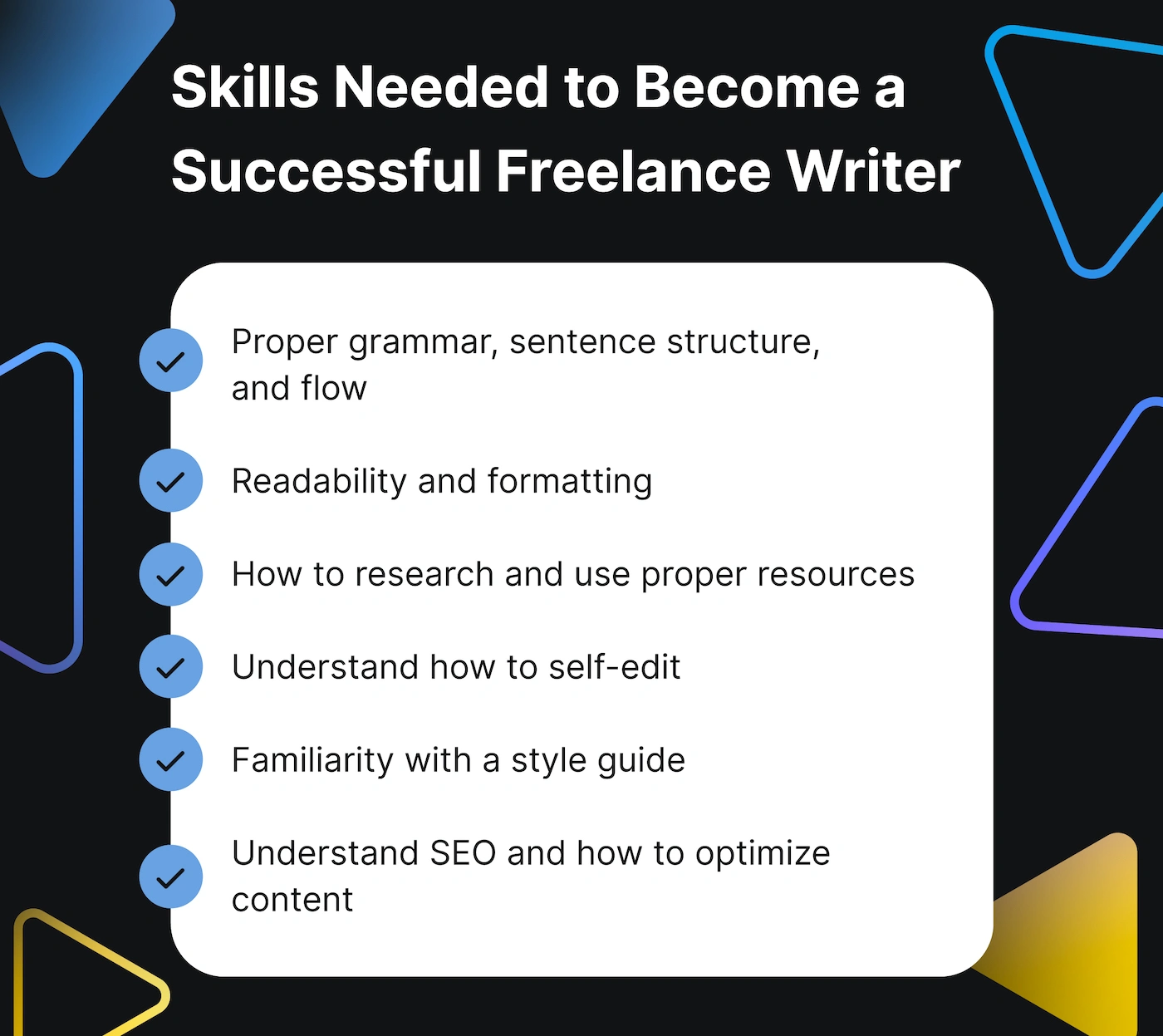
Skills:
Proper grammar, sentence structure, and flow
Readability and formatting (for long-form blog posts)
How to research and use proper resources
Understand how to self-edit
Familiarity with a style guide
Understand SEO and how to optimize your content (applicable to online writing)
Other useful skills are light knowledge of graphic design to create images to enhance your pieces, and copywriting, which is essential if you want to write sales-focused content.
Do I need all of the skills above to get started with freelance writing?
Yes and no. I was half the writer I am today (and I still learn and grow daily) when I started, and I wish I could remove some of my earlier pieces from the internet. You will improve and learn as you go along, but you will need to understand proper sentence structure, flow, and basic grammar to get started (aka write well). And nowadays, clients expect writers to understand basic SEO and how to optimize online content.
If you are unsure of your writing skill level, connect with a seasoned editor and ask them to review your work, guide you through any sticking points and show you where to improve. But beware. Don’t let perfectionism keep you from getting started. The best way to learn and gain confidence is to put yourself out there.
Step 2: Choose a Type of Writing
What type of writing work do you want to do?
One week you could be writing an email on dog training for your neighborhood pet shop, and the next week you could be writing a blog series on choosing the right mutual fund for a Fortune 500 company.
So before you get started with freelance writing, consider your preferred type of writing and focus.
There are several avenues for your freelance writing career. Let’s briefly cover a few:
Articles for print
Writing articles for print entails magazines, journals, and papers. The industry can be lucrative and rewarding but it's tough to enter and a challenge to maintain sustainable income unless an outlet hires you for multiple pieces on retainer. Otherwise, your income depends on a constant barrage of acceptances from ongoing pitches.
Books and ghostwriting
Have you ever dreamed of writing a novel? Want to see your name on the New York Times bestseller list? While this is a lofty and worthwhile goal, it requires time and dedication before the funds start rolling in.
Many independent workers who want to get published, work on these projects as a side endeavor while earning money with their main projects. One way to get published quickly is to self-publish on Amazon and market your book yourself. Here is more information on self-publishing.
Online writing for businesses
Online writing is the easiest industry to break into and earn money quickly. It entails writing online content for businesses that align with their goals. This content runs the gamut of writing and can include a variety of styles. Here are some examples:
Blogs (long-form, short-form, ultimate guides)
Press releases
Email newsletters
Social content
Copywriting (Landing pages, website content, emails, etc.)
Product descriptions
Articles on external media publications
Product descriptions
Ebooks
Video scripts
Specialized reports
Whitepapers
Case studies
Business/financial plans
Online writing can be lucrative because businesses who market online need a constant supply of content. Establishing a consistent inflow of projects is not difficult. Working with just 2-3 reliable clients can supply you with enough projects to fill up a 40-hour week.
Step 3: Choose a Specialty
Specializing in a niche makes you a sought-after expert who can command higher rates. It might seem counterintuitive to focus on one or two industries when you can earn money working in multiple but...
Would you hire a contractor to remodel your new home if he also fixes cars and moonlights as a bartender? A generalist or jack-of-all-trades might charge you less than a licensed, insured, highly experienced contractor, but you will get sub-par work because this person is not a specialist.
A serious business will want to work with a writing expert, and they will pay you for it.
So part of the process of getting started as a freelance writer is considering a specialty. This comes with a disclaimer, however. Don’t get overwhelmed with choosing a specialty right now if you aren’t 100% sure. I didn’t choose my specialty until a year into becoming a freelance writer. I naturally took my experience with digital marketing and married it with writing, and voila, my specialty was born. But the quicker you focus, the faster you can display your expertise in your chosen industry and make yourself more marketable to the right clients.
What should you specialize in? Here are a few questions that can help you hone in on a potential writing specialty:
What do you enjoy doing daily?
What skills did you learn in school?
What electives did you choose in college?
What are your professional skills?
What are your passions?
What can you talk about for hours and never get tired?
What topics are you knowledgeable about?
TIP: Choose an industry with enough demand for writers. While bedazzling sneaker laces might make you happy and even earn you kudos at your local craft fair, it will not be an in-demand writing niche that rewards you with a sustainable income.
Below are 15 lucrative freelance writing industries. Each has varying levels of income potential, but businesses in these industries require ongoing content in some form.

1. Business and marketing
2. Finance
3. SaaS
4. Cryptocurrency / blockchain
5. Technology
6. Healthcare
7. Parenting and family
8. Nonprofit
9. Fashion and beauty
10. Digital marketing
11. Education
12. Alternative health
13. Real estate
14. Sports and Entertainment
15. Travel
Some freelance writers specialize in the type of writing plus an industry if there is enough demand. For example, tech bloggers, beauty bloggers, nonprofit grant writers, IT resume writers, business copywriters, and more.
Am I Stuck to One Discipline Once I Specialize?
While I have specialized in digital marketing blogging and related topics for the last decade, I still dabble in other areas. My passion for health and wellness has enabled me to write for alternative health clinics and health professionals.
So don’t get too stuck on coming up with one focus. I recommend you specialize in something though because that will make you more desirable and viewed as an expert. But that doesn’t mean you will be pigeon-holed into that one specialty forever.
Step 4: Create an Online Profile and Professional Identity
Once you settle on a potential industry and type of writing, the next step is to set up your online footprint and build a community of like-minded people.
One of the essential components of your freelance writer’s career, especially if you choose online writing as a specialty, is your online profile or professional identity. It’s the first step to getting noticed and showcasing your skills and work, and getting paid what you deserve.
What if you don't have any samples to add to your profile? If you’re just getting started, you can:
Offer to write for a friend or family member who has a business
Write blog posts on your blog
Collaborate with other independent workers and contribute to a project. This is easy to do with a platform like Contra.
Contribute guest posts on outlets that match your chosen industry
Write for a local newspaper or website
When all else fails, create mock samples that mimic the services you want to offer potential clients. For example, if you want to become an IT resume writer, create a few sample IT resumes for your online profiles.
To get started as a freelance writer, you will need to showcase your work, set up payment capabilities, and provide a place for clients to see who you are and how you can serve their needs.
Thankfully, there is a platform that does all three—and in contrast with other independent worker platforms, it does not take a percentage of your earnings.
Contra is a professional community for the independent digital workforce that represents a new way to work. Contra caters to the independent, someone who thinks about work a little differently than the typical 9-to-5-er, whether you’re a freelancer, part-timer, moonlighter, or simply value autonomy in your work life.

Even if you are still working as an employee, Contra can help you build your value as you transition to more independent work. And as mentioned before, Contra does not take a percentage of your client earnings, which is not typical of many platforms.
Contra is perfect for the new and seasoned independent worker who wants to:
Build their independent network
Use the best tools to streamline their independent careers
Find job opportunities
Ditch the boring resume and showcase their current skills and projects instead of their past roles
Create an online identity and trusted community
Get referrals and recommendations from a trusted network
Stop working to make a living and instead work to make a difference
Contra is perfect for independent workers who focus less on their long (or nonexistent) resumes and more on their talents. If you are an undiscovered talent, Contra is your home base to create a shareable professional identity that clearly outlines who you are and your core competencies. Learn more here about building your identity on Contra.
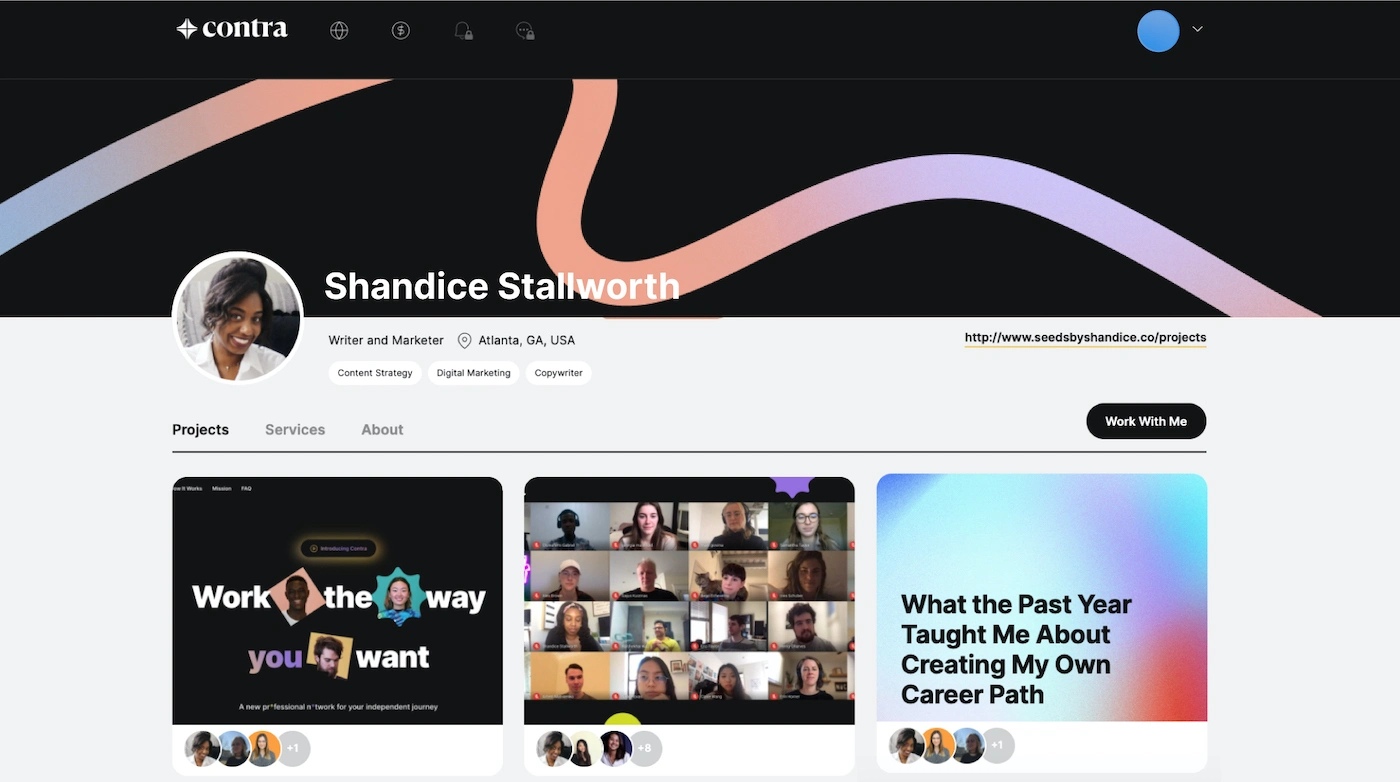
Writer Shandice Stallworth showcases her competencies and value with key projects and the people with whom she collaborates. Source
Besides being super easy to set up a professional profile, I like Contra’s innate collaboration capabilities that focus on community.
Contra empowers independent workers to find and showcase work through trusted collaborations, recommendations, and referrals. It enables the independent digital worker to love what they do and work the way they want by collaborating with like-minded people in a fluid, ever-changing environment. Create projects and tag collaborators to build your community and show potential clients the quality of your work.

Build your career around the life you want. Check out Contra and start your freelance writing career with a kicka** collaborative professional identity.
How to Get Started as a Freelance Writer: Recap
In this article, I just scratched the surface of how to get started as a freelance writer, as these steps form the foundation of successful independent writing work. We talked about freelance writing’s pros and cons, choosing a specialty, creating a professional identity, and the next steps.
Working independently in this new digital landscape allows you to express yourself and form deep connections with a growing community of people just like you. And it’s not too far from your reach. Get some writing samples in motion, create a Contra profile, and build out your professional identity. Start your Contra journey right here.
In future articles, you will learn how to get high-paying clients, create winning proposals, set competitive rates, and market your services like a pro. Good luck and hopefully I will see you around Contra!
Like this project
Posted Mar 30, 2021
Likes
0
Views
936


